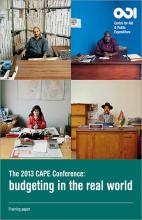-
The Global Competitiveness Report 2012–2013
Klaus Schwab, World Economic Forum 2013This year’s report features a record number of 144 economies, and thus continues to be the most comprehensive assessment of its kind. It contains a detailed profile for each of the economies included in the study as well as an extensive section of data tables with...Read More
Report -
Jamaica - Poverty and Social Impacts of Fiscal Reforms
The World Bank 2012This report explores the poverty and distributional effects of a set of recent fiscal reforms by the Government of Jamaica. It finds that relatively few households are likely to experience negative shocks to their in- come or consumption as a result of the reform...Read More
Report -
The Case for Exchange Rate Flexibility in Oil-Exporting Economies
Brad Setser, Peterson Institute for International Economics 2007High oil prices are again transforming oil-exporting economies. Economies that were moribund when oil hovered in the $20s for most of the 1990s—and at risk of bankruptcy when oil dipped to $10 a barrel in 1998—are now booming. A new generation of skyscrapers is rising...Read More
Policy Brief -
Financial Sector Development in the Middle East and North Africa
Susan Creane, Rishi Goyal, A. Mushfiq Mobarak, Randa Sab , International Monetary Fund (IMF) 2004The paper finds that the degree of financial development varies across the region. Some countries have relatively well- developed banking sectors and regulatory and supervisory regimes. However, across the region, more needs to be done to reinforce the institutional...Read More
Study -
Solving the Financial and Sovereign Debt Crisis in Europe
Adrian Blundell-Wignall, OECD Journal: Financial Market Trends, Organisation for Economic Cooperation and Development (OECD) 2012This paper examines the policies that have been proposed to solve the financial and sovereign debt crisis in Europe, against the backdrop of what the real underlying problems are: extreme differences in competitiveness; the absence of a growth strategy; sovereign,...Read More
Study -
Budgeting in the Real World: the 2013 CAPE Conference Framing Paper
Philipp Krause, Overseas Development Institute (ODI), London 2013This year’s CAPE conference will explore budgeting in the real world. Real-world budgeting can have multiple meanings. First, it evokes an idea of budgeting that is messier and more political: a broadening of scope. Second, ‘real world’ suggests a focus on budgeting as...Read More
Study -
Managing Public Debt: Formulating Strategies and Strengthening Institutional Capacity
This paper reports on progress in supporting efforts to strengthen the PDM framework in developing economies, with a special focus on the needs of LICs. It highlights lessons learned in the development and implementation of the toolkits designed for this purpose, and...Read More
Study -
A Historical Public Debt Database
S. Ali Abbas, Nazim Belhocine, Asmaa ElGanainy, Mark Horton , International Monetary Fund (IMF) 2010This paper describes the compilation of the first truly comprehensive database on gross government debt-to-GDP ratios, covering nearly the entire IMF membership (174 countries) and spanning an exceptionally long time period. The database was constructed by bringing...Read More
Study -
The Magnitude and Distribution of Fuel Subsidies: Evidence from Bolivia, Ghana, Jordan, Mali, and Sri Lanka
David Coady, Moataz El-Said, Robert Gillingham, Kangni Kpodar, Paulo Medas, David Newhouse, International Monetary Fund (IMF) 2006This paper identifies the issues that need to be discussed when analyzing the fiscal and social costs of fuel subsidies. Using examples from analyses recently undertaken for five countries, it also identifies the magnitude of consumer subsidies and their fiscal...Read More
Study -
A Taxing Business: Financing Education for All Through Domestic Resources
This report is intended to help shape the debate around financing Education For All (EFA) in an increasingly resource-constrained world, and outlines various policy options and interventions which could help to scale up more ‘equitable’ models of domestic financing for...Read More
Report









